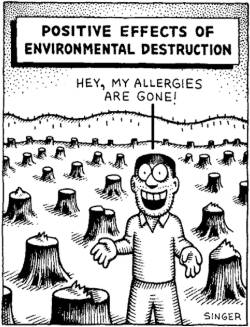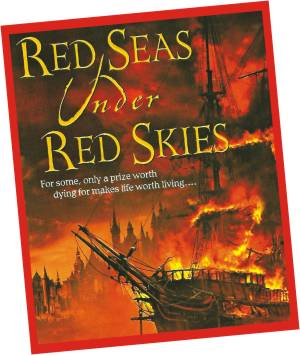Carbon and Swimming Bears
Pollution is incidentally good for us
By The Kopite
Pollution. The word is hurled out of your mouth like an unwelcome pariah, leaving a bitter after-taste of wasted sulphur and methane while you cringe and start reciting its many drawbacks. But not here. This is not the land of the politically-correct, morally-outraged 'green' people. This is where you get an alternative glimpse into the reality of pollution.
Air pollution is good for us. At least, in the same way that you might think having a capitalist system is good for us: not for the lower class (which translates to citizens of low-lying areas. Us.), but for those fat-cats holed away at the heights of our planet. Environmentalists, you might want to look away from here on out.
 Let's start with the much-maligned greenhouse gases; a haze of carbon dioxide, methane and sulphur emissions among others. They cause global warming, which is melting down tonnes of Arctic ice as we speak. That's bad, you say? Not particularly. The Earth goes through cycles of warming and cooling every few thousands of years. Global warming is a natural process and the thing that follows is - you guessed it - the Ice Age. Despite the cool name, all it really leads to are stone-cold wastelands where it's difficult to survive, unless you are a woolly mammoth. Our added pressure on heating this planet has, successfully, delayed the onset of the Ice Age. In fact, it should have started by now. Global warming is the reason why generations will be able to update annoying statuses on Facebook for the foreseeable future instead of, say, freezing to death.
Let's start with the much-maligned greenhouse gases; a haze of carbon dioxide, methane and sulphur emissions among others. They cause global warming, which is melting down tonnes of Arctic ice as we speak. That's bad, you say? Not particularly. The Earth goes through cycles of warming and cooling every few thousands of years. Global warming is a natural process and the thing that follows is - you guessed it - the Ice Age. Despite the cool name, all it really leads to are stone-cold wastelands where it's difficult to survive, unless you are a woolly mammoth. Our added pressure on heating this planet has, successfully, delayed the onset of the Ice Age. In fact, it should have started by now. Global warming is the reason why generations will be able to update annoying statuses on Facebook for the foreseeable future instead of, say, freezing to death.
But what about us? And trees? And all the other wildlife that risk going extinct because of our practices? The answer is simple, 3 billion years old and staring you in the face (if you happen to be looking at a mirror, that is). It's you. Evolution. Species adapt to change all the time; if they don't they become extinct. Given our resources and advances at this time, it's highly unlikely that we'll become extinct. Amazing research by the NSF in the USA report that plants have already begun to 'evolve' by absorbing more carbon from the atmosphere. The Earth is cleaning itself. 500 years from now, people might just be fawning over hybrid swimming polar bears. All because the ice caps melted and evolution took its course (you might even have a third eye by then; with 360 degree vision). Ice caps melting also frees up areas for fuel exploration. No one would admit it, but that's what they're really looking forward to.
So, is it all well and good? Should we continue in this destructive vein? Of course not. It's basically about climbing out of the hole we dug ourselves into by excess wastage and our ignorance towards family planning. But that hole really helped us dodge a bullet, a very icy bullet. 'Tree-huggers' love to brand pollution as bad. Granted, waste gases are very harmful, but the complexity of the Earth's ecosystem is far beyond our imagination. It responds to changes itself and it's best to see this through shades of gray. That said though, don't litter or waste just for the heck of it. Contrasting opinions are present on both sides and it's hard to see how they might reconcile. So today, we sign off with our very own answer to the energy dilemma facing the world. Oil prices too high for your car? Walk.
Disclaimer: Opinions expressed are the writer's own. Whether he should be thrown into deep water to test the adaptive abilities of humans is up for debate.
 BOOK REVIEW
BOOK REVIEW
Red Seas Under Red Skies
By Scott Lynch
Reviewed by Tareq Adnan
([email protected])
Certain authors manage to incite in the reader a level of enthusiasm that can be almost called zealotry. Look at what L Ron Hubbard achieved with his work. Not to say that Lynch will go on to create a cult of his own called Monkeyshineology. But Lynch does write better, if not just as well, as Hubbard ever did.
The events of the first book left the reader in somewhat of a lurch. While appreciative of Locke Lamora and Jean Tannen's sheer audacity in the face of the odds against them, one does feel saddened by the departure from Camorr. There is this feeling of unfinished business left behind in the city. The second book ostensibly takes place in Camorr's rival city state, Tal Verrar.
Lynch's talent in world building shows through again with this new city, which is markedly different from the claustrophobic, Venice-like Camorr. He manages to instill enough ambience and character to make the city seem like a place we know, or at least once knew. There are familiar truths mixed in with the fantastical descriptions that make everything you imagine feel on this side of real.
 In this installment of the Gentlemen Bastards, the reader is shown how Locke Lamora and Jean Tannen have made for themselves a nice little niche in the gambling houses of Tal Verrar, conning honest and dishonest gamblers. Their ultimate goal is of course to land themselves a big fortune, by cheating someone else out of theirs. Like always, the complete lack of anything resembling a conscience in the face of
In this installment of the Gentlemen Bastards, the reader is shown how Locke Lamora and Jean Tannen have made for themselves a nice little niche in the gambling houses of Tal Verrar, conning honest and dishonest gamblers. Their ultimate goal is of course to land themselves a big fortune, by cheating someone else out of theirs. Like always, the complete lack of anything resembling a conscience in the face of
their own benefit makes these characters all the more interesting. Especially when considering the slew of honest and noble characters that one finds in every other fantasy series.
Unlike the first book, where Lynch focused primarily on creating a world full of organized crime, territorial in their activities all bowing down to an overarching overlord; this book focuses on a more disparate element of the criminal world. Pirates. Through a sequence of events that sometimes prove to be both hilarious and devious, the Gentlemen Bastards end up on a pirate ship. And learn to be pirates. And then become pirates. The one area of stealing that they hadn't taken part in before during their rather rigorous training.
The story is somewhat less complicated than the last one, mostly because Lynch seems to have learned from his mistakes. Instead of haphazardly shifting between the past and the present, which he still does, he has learned how to pace each segment so that the book doesn't feel hacked together. There are more villains that Locke and Jean have to deal with and the villains themselves are refreshingly different and colourful in their own rights and the readers learn to hate them so. Added to this is the fact that the Bastards haven't really managed to escape their past, or the fact that deep down, they are still Camorri. They need revenge for every slight ever dealt to them.
Fantasy books are renowned for their size and heft. Lynch doesn't seem to need three hundred thousand words to tell a huge story. He has a sense of brevity, managing to tell a far longer story than one would have anticipated. And he leaves the reader once again with the feeling that there was so much more the characters could have done in Tal Verrar.
Read this book. If only because we need to one day create Monkeyshineology. Tom Cruise would donate his eyes to monkeyshine.
